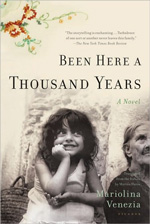

Picador, paperback, 9780312429782
One of the things I look for in a novel is a sense of place, the ability of an author to transport me across the world and set me down in a setting very different from my own. I do not just want descriptions of what a town or city looks like; I want to understand the place—its customs, its people, its smells and tastes. Reading should be a form of travel, and an adventurous reader has the opportunity to really see the world. In Been Here a Thousand Years, Mariolina Venezia's beautifully poetic novel, small-town Italy takes centre stage. Venezia captures the spirit of her country in vivid language, taking time to describe life's everyday details—and making readers crave good olive oil and bread in the process.
Been Here a Thousand Years is about the Falcone family. It starts with the pairing of Don Francesco Falcone, a wealthy landowner, and a field worker, Concetta. Never married, these two fiery characters produce a long line of daughters, who in turn all have daughters of their own. Five generations from Concetta comes Gioia, who narrates the stories of her ancestors. Each daughter, as strong-willed as her predecessors, lives with a personal tragedy, and learns to make the best of life. Along the way, the reader learns the history of modern Italy, flying through the past 150 years. The lost wealth and crumbling estate of Don Francesco mirror the tumultuous nature of the country, and political debates pepper the narrative as frequently as they would the dinner table at a large family get-together.
The Falcone women are all rather alike; Venezia tells their stories swiftly, and the reader is apt to mix up characters and events through the years. These women all share certain qualities: an unfailing spirit, the desire for something better, and the unfortunate tendency to fall for the wrong man. This, I think, is purposeful—Venezia is not trying to create five generations of distinctive people, but instead is showing the lasting nature of a great family, and of her country.
Reflecting back on Been Here a Thousand Years, it is not the stories that have stayed with me, but
the overarching picture of Italy. Its history and customs are alive in Venezia's writing. From the
seemingly magical river of olive oil running through the village to the feisty arguments between characters,
this novel situates the reader in a land worth visiting—a place where tragedy strikes, but where
the human spirit endures.
